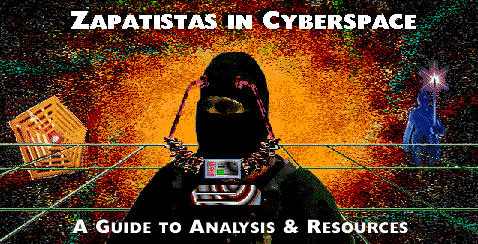

The indigenous character of the Zapatista rebellion has also provoked new awareness, respect and study of the much broader phenomenon of indigenous revival and struggle in this period.
The Zapatista analysis of neoliberalism (the Latin American term for pro-market, pro-business and anti-worker/peasant policies) has led to discussions and analyses of the similarities with Thatcherism in England, EU-Maastricht policies in Europe, IMF adjustment programs in Africa and Asia, Reagan-Bush-Clinton supply-side policies in the US and so on. The enormous response to the 1996 Zapatista call for a series of continental and intercontinental Encounters led to an historic gathering in Chiapas at the end of July 1996 where over 3,000 grassroots activists and intellectuals from 42 countries on 5 continents came together to discuss the struggle against neoliberalism on a global scale.
As a result of those summer meetings efforts spread and deepened to build an Intercontinental Network of Alternative Communication (Spanish acronym = RICA) to accelerate the intercontinental circulation of struggle by providing vehicles for the sharing of experience and the discussion of strategies for fighting for the overthrow of neoliberalism, of capitalism more generally and for the development and spread of a wide variety of alternative ways of organizing social life. These efforts are proceeding in many areas of communication including cyberspace, radio & television, music and film.
The Intercontinental Encounter of 1996 in Chiapas led to a second in 1997 in Spain, and that, in turn, led to multiplying intercontinental confrontations with supranational capitalist policy making. The first of such confrontations to receive international attention was the moblization against the World Trade Organization meetings in Seattle that brought over 30,000 protestors from all over the world. They shut the meetings down and drew the world media attention to the spreading global opposition to capitalist attempts to impose neoliberalism throughout the globe. Since then there have been multiple confrontations of the same sort. The intercontinental network of grassroots networks has proved increasingly effective in carrying resistance to the same level as capitalist policy making.
During this same period the sophistication of the networks has grown rapidly. Perhaps most striking has been the development of the Independent Media Network (that was born in Seattle during the protests there) that provides alternative information about struggles in an ever growing number of countries, including streamed audio and video in real time.
Against this backdrop, this guide was first compiled in 1996 for two purposes: first, as an aide to activists and second, as a survey of cyberspacial activities associated with Zapatista struggle (and of the pro-democracy movement in Mexico more generally). As those struggles have grown and spread and have developed more and more connections with other efforts in other places, the array of connections in cyberspace has changed again and again. Old connections have been dissolved and new ones developed. Internet lists have appeared, seen their management change, and have sometimes disappeared. Websites have been put up and flourished or withered according to the possibilities and energies of their authors as well as the degree to which they have met the needs of various struggles. This website, therefore, contains both currently active connetions of various sorts as well as a "archive" of defunct sites and resources. It is a portal of sorts to one "space" of cyberspace, one piece of the emerging fabric of relationships that is challenging capitalist command and seeking alternative ways of being and relating, seeking to build new worlds, as the Zapatistas say.